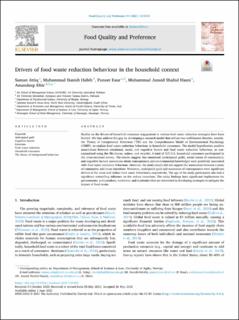| dc.contributor.author | Attiq, Saman | |
| dc.contributor.author | Danish Habib, Muhammad | |
| dc.contributor.author | Kaur, Puneet | |
| dc.contributor.author | Junaid Shahid Hasni, Muhammad | |
| dc.contributor.author | Dhir, Amandeep | |
| dc.date.accessioned | 2023-02-22T11:16:01Z | |
| dc.date.available | 2023-02-22T11:16:01Z | |
| dc.date.created | 2021-07-23T15:31:54Z | |
| dc.date.issued | 2021 | |
| dc.identifier.citation | Attiq, S., Habib, M. D., Kaur, P., Hasni, M. J. S., & Dhir, A. (2021). Drivers of food waste reduction behaviour in the household context. Food Quality and Preference, 94, 104300. | en_US |
| dc.identifier.issn | 0950-3293 | |
| dc.identifier.uri | https://hdl.handle.net/11250/3053187 | |
| dc.description.abstract | Studies on the drivers of household consumer engagement in various food waste reduction strategies have been limited. We thus address this gap by developing a research model that utilises two well-known theories, namely, the Theory of Interpersonal Behaviour (TIB) and the Comprehensive Model of Environmental Psychology (CMEP), to explain food waste reduction behaviour in household consumers. The model hypothesises positive associations between emotional, social, and cognitive factors and food waste reduction behaviour, as conceptualised using the 3Rs (reuse, reduce, and recycle). A total of 515 U.S. household consumers participated in the cross-sectional survey. The results suggest that emotional (anticipated guilt), social (sense of community), and cognitive factors (awareness about consequences and environmental knowledge) were positively associated with food waste reduction behaviour. However, the study results did not support the association between a sense of community and reuse intentions. Moreover, anticipated guilt and awareness of consequences were significant drivers of the reuse and reduce food waste behaviours, respectively. The age of the study participants also had a significant controlling influence on the reduce intentions. The study findings have significant implications for governments, policymakers, marketers, and academics that are interested in developing strategies to mitigate the impact of food waste. | en_US |
| dc.language.iso | eng | en_US |
| dc.publisher | Elsevier | en_US |
| dc.rights | Navngivelse 4.0 Internasjonal | * |
| dc.rights.uri | http://creativecommons.org/licenses/by/4.0/deed.no | * |
| dc.title | Drivers of food waste reduction behaviour in the household context | en_US |
| dc.type | Peer reviewed | en_US |
| dc.type | Journal article | en_US |
| dc.description.version | publishedVersion | en_US |
| dc.rights.holder | The authors | en_US |
| dc.subject.nsi | VDP::Samfunnsvitenskap: 200 | en_US |
| dc.source.pagenumber | 1-11 | en_US |
| dc.source.volume | 94 | en_US |
| dc.source.journal | Food Quality and Preference | en_US |
| dc.identifier.doi | 10.1016/j.foodqual.2021.104300 | |
| dc.identifier.cristin | 1922509 | |
| cristin.ispublished | true | |
| cristin.fulltext | original | |
| cristin.qualitycode | 1 | |

